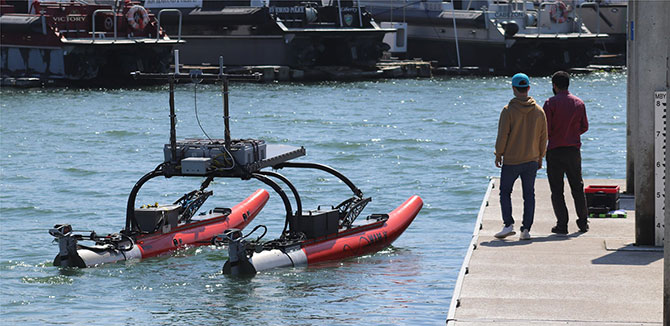Bringing Robotics to the High Seas
Peter Sauer came to the MSR program looking to combine his passion for robotics and the water; he’s now helping bolster maritime security for the U.S. in the Middle East.

Peter Sauer grew up along the Long Island Sound in Westport, Conn. Not surprisingly, he developed an attachment to the water.
He joined the sailing team at the University of Wisconsin, and when he was home from college he worked as a sailing instructor at the nearby Norwalk Yacht Club. Now, with a degree from Northwestern Engineering's Master of Science in Robotics (MSR) program, Sauer is making his living on the water – water far from his original hometown.
Sauer is a mechatronics engineer with Marine Advanced Robotics, a San Francisco-based company that for nearly two decades has pushed the autonomous boating industry forward for industries ranging from marine research to the U.S. military. He currently is working in the Middle Eastern island nation of Bahrain, showing the U.S. Navy the latest possibilities with autonomous water vehicles that could help boost security for the American fleet in the region.
“I'm currently doing a demo with Task Force 59 to help usher in the next generation of maritime domain awareness using robotics and artificial intelligence (AI),” he said. “The goal is to eventually have an autonomous fleet of boats that constantly patrols and maintains security on the water.”
The Navy launched Task Force 59 in 2021 to focus on integrating AI with unmanned systems.
To this job Sauer brings the lessons from his recent experiences in the MSR program. He joined the cohort as the COVID-19 pandemic gripped the world and said he found solace in the tight-knit group.
The biggest takeaway from the program that he leans on now in his working life centers on what parts of a project take the most effort.
“Budgeting time for debugging code was a big lesson,” he said. “Often I would come close to a solution but spend twice the time I spent getting there figuring out the last 5 to 10 percent.”
The boats Marine Advanced Research builds are designed to be stable on rough seas and help a wide variety of industries. The company’s customers range from Australian Maritime College and the Korea Institute of Ocean Science & Technology, to Google and the U.S. Army Corps of Engineers.
Its flagship technology is the Wave Adaptive Modular Vessel – the WAM-V. The technology provides surface stability for autonomously controlled boats that enable them to serve as a platform for devices that can do everything from locating underwater obstacles and hazards near a port to providing security around U.S. warships. One WAM-V can work solo, or multiple can be linked together to provide a security perimeter.
Sauer said he confronts the same situations with his work today that he did during his time in the MSR program.
“The boats we build are very similar in that the last 10 percent of the build is often 80 percent of the effort,” he said.
But just like with his work in the MSR program, Sauer applies the lesson he learned about the strength of a dedicated cohort.
“I liked the cohort aspect of MSR. Having a solid group of other students to work with consistently was really beneficial,” he said. “I've found that in the work environment, taking time to help others with their projects is both very helpful to the company as a whole and often leads toward a solution to my own debug problems.”
That give-and-take with others now is at the foundation of Sauer’s work ethic as he applies his MSR skills far from home. Because of how relevant the MSR lessons are to his daily life now, he remains a steadfast advocate of the program.
“MSR is a great program that is very good at being solid in theory and practice,” he said. “You'll learn the reasons behind why any algorithm works but also how to implement it in a way that would make sense in industry.”

